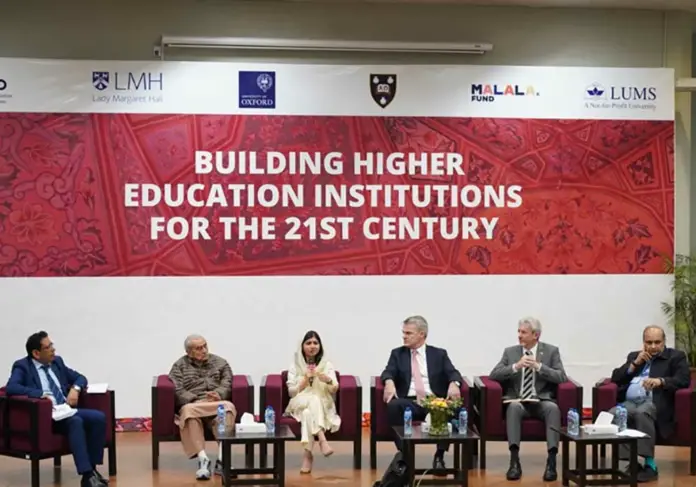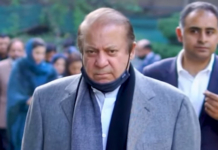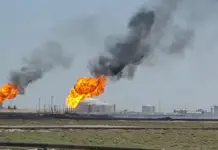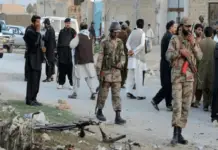Nobel’s youngest peace prize winner, Malala Yousafzai, was part of a distinguished panel discussion on Building Higher Education Institutions for the 21st Century.
Organised by the Oxford Pakistan Programme (OPP) and the Syed Ahsan and Syed Maratib Ali School of Education (SOE) at LUMS, the panel, on the second day, engaged a packed audience in discussing both challenges and opportunities. Dr. Talha Jamal Pirzada introduced the panel and said, “One of the core aims of the OPP is to increase Pakistani representation at Oxford, and also bring Oxford to Pakistan, and this discussion is a humble effort to do just that.” Much of the discussion focused on access to quality education. Ms. Yousafzai strongly advocated for greater access, particularly for female students. “The future for girls in Pakistan relies on the quality of education they receive. The biggest inspiration for girls is seeing women progressing in their professional careers. Their success stories inspire them.”
Joining Ms. Yousafzai was LUMS Founding Pro-Chancellor and visionary, Syed Babar Ali; Professor’s Stephen Blyth, Principal, Lady Margaret Hall and Dr. Nick Brown, Principal, Linacre College from the University of Oxford; and Dr. Faisal Bari, Dean, SOE. The panel discussion was moderated by Prof Dr. Adeel Malik, University of Oxford, and co-founder of OPP.
Dr. Arshad Ahmad, Vice Chancellor, LUMS, emphasised the role of exceptional learning in addressing grand challenges facing Pakistan and shared how the University’s Learning Without Borders perspective has led to a number of national high-impact interventions. “At the heart of Learning With-out Borders are systems designed to put learning first in not only governance and decision making, but also in LUMS shared ethos.” He added, “Three indicators of exceptional learning and its impact can be seen in addressing issues about access, relevance and collaboration, all of which are grounded in LUMS values”.
Sharing his experiences from Oxford, Professor Blyth said, “Oxford and Lady Margaret Hall have done tremendous work to reduce barriers so that education is accessible to the most people. Meanwhile in another panel discussion, Dr Abid Burki, Dr Naveed Arshad, Dr Javed Yunus, Dr Robyn Meeks, Dr Sabrin Beg, Dr Maira, and others talked on Energy For Development. Dr Abid Burki threw light on changing environmental conditions and its effects on agriculture sector. He showed with data that agriculture produce was directly proportional to temperature of the area.
Dr Naveed reflected true picture of energy crisis in Pakistan and what can be possible first aid for it. He also highlighted the issues relating to gas shortage. Addressing to a question on circular debt and its consequences on the energy sector he said that it would be hard to give easy solution to this big issue. Dr Maira talked on irrigation bureaucracy, its attitude and effects on growth sector. Ijaz Naqvi spoke on access to power, electricity and the infrastructure state in Pakistan. His study mainly focused the federal capital area Islamabad and issues of the consumers.
Likewise, Dr Yunus and Dr Meeks spoke on electricity theft in the country and how Karachi Electric overcame it in a couple of years. They suggested that the rest of the discos should also replicate the measures adopted adopted by Karachi electric. The speakers said that there are several reasons for the current energy crisis in Pakistan. These reasons include: a) the country’s rapidly growing population, which is putting an increasing strain on the available resources; b) a lack of investment in the power sector due to decades of political instability and mismanagement; c) rampant theft of electricity, which has led to a significant decline in line losses; and d) insufficient generation capacity to meet the growing demand for electricity.
In order to overcome the energy crisis, it is important to address these underlying causes. Additionally, Pakistan should explore alternative sources of energy such as solar and wind power, which has the potential to meet the country’s growing energy needs.In order to overcome the energy crisis, it is important to address these underlying causes. Additionally, Pakistan should explore alternative sources of energy such as solar and wind power, which has the potential to meet the country’s growing energy needs.







